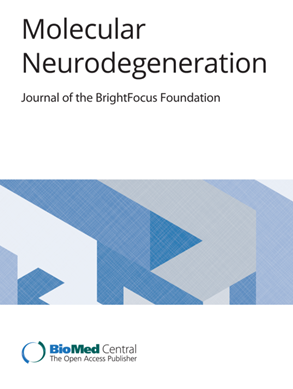对 APOEε4 携带者的蛋白质组分析表明,脂质代谢、补体和淋巴细胞信号传导与认知恢复能力有关
IF 14.9
1区 医学
Q1 NEUROSCIENCES
引用次数: 0
摘要
载脂蛋白 E(APOE)ε4 等位基因是晚发性阿尔茨海默病(AD)的最强遗传风险因素。这项病例队列研究采用了靶向血浆生物标志物和大规模蛋白质组学方法,研究了使一些 APOEε4 携带者在老年期保持正常认知功能的生物机制。1996年至1999年参加妇女健康倡议记忆研究(WHIMS)的APOEε4携带者和APOEε3同卵双生者,如果在80岁以后仍无认知障碍,则被归类为有复原力者;如果在80岁以前或80岁时出现认知障碍,则被归类为无复原力者。我们对参与者在认知能力正常时(平均 14 年前)加入研究时采集的血液中的 AD 病理学(Aß42/40)和神经变性(NfL、tau)生物标志物以及 1007 种蛋白质(Olink)进行了量化。我们确定了区分有复原力和无复原力的 APOEε4 携带者的血浆蛋白,研究了这些关联是否会扩展到 APOEε3 同卵双生者,并在英国生物库中复制了这些发现。共纳入了 1610 名参与者(基线年龄:71.3 [3.8 SD] 岁;均为白人;42% 为 APOEε4 携带者)。与抗逆性 APOEε4 携带者相比,非抗逆性 APOEε4 携带者的 Aß42/40/tau 比值较低,基线 NfL 较高。蛋白质组学分析发现,抗逆性和非抗逆性 APOEε4 携带者之间有四种蛋白质的表达存在差异,FDR 校正后的 P < 0.05。其中一个候选蛋白是神经元损伤的标志物(NfL),它也能区分有复原力和无复原力的 APOEε3 基因携带者,而另外三个蛋白(已知参与脂质代谢(ANGPTL4)和免疫信号转导(PTX3、NCR1))仅能预测 APOEε4 基因携带者的复原力和无复原力状态(蛋白*基因型相互作用-P < 0.05)。在英国生物库验证样本(N = 9420)中,这四种蛋白质中有三种也能预测 APOEε4 携带者的 14 年痴呆风险。虽然候选蛋白质与AD病理学的靶向生物标志物几乎没有关联,但蛋白质网络和富集分析表明,自然杀伤(NK)细胞和T淋巴细胞信号传导(通过PKC-θ)可区分抗逆性APOEε4携带者和非抗逆性APOEε4携带者。我们发现并复制了与 APOEε4 携带者认知复原力相关的血浆蛋白质组特征。这些蛋白质表明,尽管AD遗传风险升高,但特定的免疫过程与认知状态的保持有关。未来需要在不同的队列中进行研究,以评估这些结果的普遍性。本文章由计算机程序翻译,如有差异,请以英文原文为准。
Proteomic analysis of APOEε4 carriers implicates lipid metabolism, complement and lymphocyte signaling in cognitive resilience
Apolipoprotein E (APOE) ε4 allele is the strongest genetic risk factor for late onset Alzheimer’s disease (AD). This case-cohort study used targeted plasma biomarkers and large-scale proteomics to examine the biological mechanisms that allow some APOEε4 carriers to maintain normal cognitive functioning in older adulthood. APOEε4 carriers and APOEε3 homozygotes enrolled in the Women’s Health Initiative Memory Study (WHIMS) from 1996 to 1999 were classified as resilient if they remained cognitively unimpaired beyond age 80, and as non-resilient if they developed cognitive impairment before or at age 80. AD pathology (Aß42/40) and neurodegeneration (NfL, tau) biomarkers, as well as 1007 proteins (Olink) were quantified in blood collected at study enrollment (on average 14 years prior) when participants were cognitively normal. We identified plasma proteins that distinguished between resilient and non-resilient APOEε4 carriers, examined whether these associations generalized to APOEε3 homozygotes, and replicated these findings in the UK Biobank. A total of 1610 participants were included (baseline age: 71.3 [3.8 SD] years; all White; 42% APOEε4 carriers). Compared to resilient APOEε4 carriers, non-resilient APOEε4 carriers had lower Aß42/40/tau ratio and greater NfL at baseline. Proteomic analyses identified four proteins differentially expressed between resilient and non-resilient APOEε4 carriers at an FDR-corrected P < 0.05. While one of the candidate proteins, a marker of neuronal injury (NfL), also distinguished resilient from non-resilient APOEε3 homozygotes, the other three proteins, known to be involved in lipid metabolism (ANGPTL4) and immune signaling (PTX3, NCR1), only predicted resilient vs. non-resilient status among APOEε4 carriers (protein*genotype interaction-P < 0.05). Three of these four proteins also predicted 14-year dementia risk among APOEε4 carriers in the UK Biobank validation sample (N = 9420). While the candidate proteins showed little to no association with targeted biomarkers of AD pathology, protein network and enrichment analyses suggested that natural killer (NK) cell and T lymphocyte signaling (via PKC-θ) distinguished resilient from non-resilient APOEε4 carriers. We identified and replicated a plasma proteomic signature associated with cognitive resilience among APOEε4 carriers. These proteins implicate specific immune processes in the preservation of cognitive status despite elevated genetic risk for AD. Future studies in diverse cohorts will be needed to assess the generalizability of these results.
求助全文
通过发布文献求助,成功后即可免费获取论文全文。
去求助
来源期刊

Molecular Neurodegeneration
医学-神经科学
CiteScore
23.00
自引率
4.60%
发文量
78
审稿时长
6-12 weeks
期刊介绍:
Molecular Neurodegeneration, an open-access, peer-reviewed journal, comprehensively covers neurodegeneration research at the molecular and cellular levels.
Neurodegenerative diseases, such as Alzheimer's, Parkinson's, Huntington's, and prion diseases, fall under its purview. These disorders, often linked to advanced aging and characterized by varying degrees of dementia, pose a significant public health concern with the growing aging population. Recent strides in understanding the molecular and cellular mechanisms of these neurodegenerative disorders offer valuable insights into their pathogenesis.
 求助内容:
求助内容: 应助结果提醒方式:
应助结果提醒方式:


